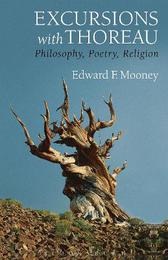
|
Excursions with Thoreau: Philosophy, Poetry, Religion
Paperback / softback
Main Details
| Title |
Excursions with Thoreau: Philosophy, Poetry, Religion
|
| Authors and Contributors |
By (author) Professor Edward F. Mooney
|
| Physical Properties |
| Format:Paperback / softback | | Pages:296 | | Dimensions(mm): Height 216,Width 140 |
|
| Category/Genre | Literary studies - c 1800 to c 1900
Western philosophy - c 1600 to c 1900 |
|---|
| ISBN/Barcode |
9781501305641
|
| Classifications | Dewey:818.309 |
|---|
| Audience | | Professional & Vocational | |
|---|
| Illustrations |
2 illustrations
|
|
Publishing Details |
| Publisher |
Bloomsbury Publishing Plc
|
| Imprint |
Bloomsbury Academic USA
|
| Publication Date |
22 October 2015 |
| Publication Country |
United States
|
Description
Excursions with Thoreau is a major new exploration of Thoreau's writing and thought that is philosophical yet sensitive to the literary and religious. Edward F. Mooney's excursions through passages from Walden, Cape Cod, and his late essay "Walking" reveal Thoreau as a miraculous writer, artist, and religious adept. Of course Thoreau remains the familiar political activist and environmental philosopher, but in these fifteen excursions we discover new terrain. Among the notable themes that emerge are Thoreau's grappling with underlying affliction; his pursuit of wonder as ameliorating affliction; his use of the enigmatic image of "a child of the mist"; his exalting "sympathy with intelligence" over plain knowledge; and his preferring "befitting reverie"-not argument-as the way to be carried to better, cleaner perceptions of reality. Mooney's aim is bring alive Thoreau's moments of reverie and insight, and to frame his philosophy as poetic and episodic rather than discursive and systematic.
Author Biography
Edward F. Mooney is Emeritus Professor of Philosophy and Religion at Syracuse University, USA. He is the author or editor of nine books, including Kierkegaard's Repetition and Philosophical Crumbs (Editor and Introduction, 2009), Lost Intimacy in American Thought (Continuum, 2009), and Excursions with Kierkegaard (Bloomsbury, 2012).
ReviewsHenry David Thoreau brought to philosophical writing a personal voice and a situated, embodied sensibility. Edward Mooney proves himself a worthy heir to Thoreau's legacy by speaking to his readers as an extracurricular intellectual and spiritual companion. We follow along as Thoreauvian saunterers, adventuring through rich fields of reverie, with Mooney as our engaging and always insightful guide. Excursions with Thoreau is a powerful illustration of how philosophy can live up to its name as the love of wisdom, grounded in wonder and defined by transformative encounters. It sheds new light on the work of a great American philosopher of the nineteenth century, and will introduce readers to Mooney's distinctive mode of narrative reflection on human experience and its meaning. * Rick Anthony Furtak, Associate Professor of Philosophy, Colorado College, USA * Without wasting time on the tired question of whether or not Thoreau is a philosopher, Mooney's decisive arguments uncover for us the profundity and strangeness of the thinker's ideas. Mooney carefully and elegantly uncovers a Thoreau who is attentive to questions of life and loss that led him to formulate a complex ethics while rethinking the meaning of the communal. By bringing Thoreau into conversation with such thinkers as Marx and Kierkegaard, Mooney reveals challenges in Thoreau's writings that have still not been sufficiently addressed. Excursions with Thoreau is beautifully written and will be indispensable for future conversations about that writer. * Branka Arsic, Professor of English and Comparative Literature, Columbia University, USA * This is, from my point of view, a delightful book. ... Mooney is not just interested in explicating Thoreau. The title, Excursions with Thoreau, is meant more seriously. The essays attempt not only to show us Thoreau's way of living, (or, what I called above, his being-in-the-world) but, to some degree, to initiate Mooney himself, and his readers, into that way of life. ... Mooney masterfully characterizes the complexity (and sometimes contradiction) that structure these ways of being in the world. * Notre Dame Philosophical Reviews *
|